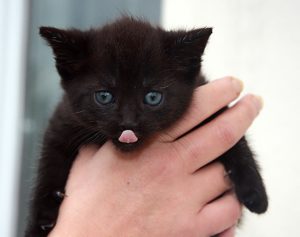How To Care For Newborn Kittens

Since this time of year is one of the most popular for cats to become pregnant and give birth, understanding how to care for newborn kittens may be useful knowledge for you to have! If you find the guardian of newborn kittens, here are some tips you should know in order give the kittens a chance to survive.
1. Always Have A Veterinarian
Since caring for newborn kittens is not a day-to-day struggle for most people, it is essential for someone caring for a litter of kittens to keep in contact with a local and trusted veterinarian professional. It is better to be safe than sorry when dealing with newborn kittens and having a veterinarian you can call at anytime will ease a person’s stress and help if the kittens need medical attention. The veterinarian can give you tips and advice on caring for these animals as well as be there in case of an emergency. Caring for kittens for the first time can be stressful, a lot of work, and fairly scary for most people, but a veterinarian can help stress subside and make caretakers of newborn kittens more knowledgeable about how to handle certain situations.
Feeding a kitten is not as easy as feeding an adult cat is. Surprisingly, there are a lot of precautions and safety measures people should take when attempting to bottle-feed a newborn kitten.
A. First thing’s first – holding the kitten correctly. This is of upmost importance because if a kitten is held wrong while being bottle-fed, it can aspirate. This means that the milk can enter their lungs, which is not good!
B. Secondly, assuring that the milk is the correct temperature is important. Feeding a kitten milk that is too cold can cause their body temperature to decrease and feeding a kitten milk that is too hot will burn them. As with a human baby, the best way to make sure the milk is the right temperature is to let it sit under or in hot water and then test the temperature by squeezing a drop onto your wrist.
If the kitten does not attach to the nipple of the bottle, they will have to be fed via syringe. 2ndChance.info says that during this process, the caretaker wants to make sure they are not forcing too much milk into the kitten’s mouth as it can choke or aspirate. Gently squeeze a few drops at a time into the kitten’s mouth and continue this process until the kitten refuses to drink any more. Newborn kittens need to be fed every three to four hours as this is what their mother would normally do. Therefore, if one is unable to be available for this every few hours, you should consider enlisting the help of a rescue or someone who has the time to take on this tremendous responsibility.
3. Warmth
Always checking if newborn kittens are warm is the most nerve-wracking thing for someone parenting a litter since being too cold can lead to a newborn kitten’s death. This is why it is dire that the kittens are continuously warm and checked on every three hours. If a kitten becomes too cold, its body shuts down leading to its untimely death. This is a big reason why many pass away during foster care from shelters or rescues during wintertime because not many people know to keep them constantly warm. One way to accomplish this is to keep the newborn kittens in a cage or carrier with a heating pad underneath turned to either the first or second degree, but never the hottest. Then, while feeding the kittens every three to four hours, check and make sure the kittens are still very warm and breathing at a normal rate. Kitten-Rescue.com relays that actually filling an old sock with uncooked rice and then microwaving it for no more than sixty seconds can keep kittens warm as well. Place the warm rice sock nearby the kittens and the kittens will cuddle around or on top of it to keep warm. The only issue with this choice is that it may not hold its warmth for the three hours allotted, so it may need to be microwaved more than once during that time frame. Kittens are very fragile when they are newborn up until about five or more weeks old because their bodies cannot regulate their temperature independently and their immunity systems are not as strong when they are this young.
This is not the most pleasant thing, but you need to stimulate the newborn kitten to urinate or excrete. This process is quite simple, and honestly one of the easiest things to do when caring for newborn kittens. All you have to do is take a cotton ball, wet it slightly, and rub gently on the kitten’s genitals to stimulate them after you feed them. TheSpruce.com states that this simulates what the mother cat would do as she would lick at the kittens to make them defecate and urinate after each feeding. If you don’t do this, the kittens can become too filled with urine or fecal matter that it ends up coming out by itself in a mess since newborn kittens have no control of their tracts. It is safest to just “poop”, or stimulate, the kittens every time after a good feeding to assure they are defecating and urinating at the correct amount and to monitor their bodily functions to assure they are healthy. Eventually, as their body develops, the kitten will learn how to control their bathroom habits and likely learn how to use a litter box.
Have you ever had to care for a newborn kitten? What tips would you suggest to someone who finds themselves entrusted with the care of a kitten? Leave a comment and let us know!


